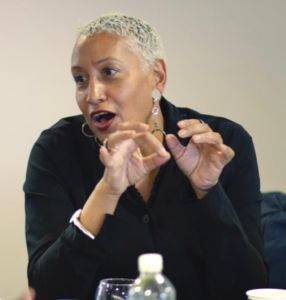Too Hot to Handle is written by Roger Kline and Joy Warmington and published by brap on February 6th 2024. Legal advice for the brap report was provided by Shazia Khan
10 months ago, nurse manager Michelle Cox obliterated attempts by NHS England to defend the racial discrimination she had been subjected to and which ended her career in the NHS. The 40-page Employment Tribunal judgement heavily criticised NHS England on almost every conceivable ground.
In the weeks that followed further claims of race discrimination by NHS staff were defended by several Trusts (at great cost to the taxpayer) and convincingly upheld by Tribunals. For example, Central and North West London bizarrely defended a case in which a Black nurse said she had been told by a manager – after she complained of racial abuse from patients – “to get a pool of bleach and bleach your skin so that you come back tomorrow white and the patients will be nice to you”. The Trust lost the case.
But it is actually very difficult to win claims of race discrimination in court – the reality is a real David and Goliath scenario in which NHS Trusts spend a fortune on lawyers against litigants who are often alone, beaten up by their experience, and who may never work in the NHS again – even if they win.
But when courts do accept race discrimination has occurred, their judgements shine a light on the combination of ignorance, avoidance, denial, incompetence and downright nastiness that constitutes the experience of many Black and Minority Ethnic staff when they dare to question or challenge their treatment.
To test whether those judgements reflected a generalisable pattern in staff experience we conducted a survey into experiences of raising racism in the NHS. 1300 NHS staff responded, and they overwhelmingly confirmed what the courts said.
Black and Minority ethnic staff told us that they were subjected to greater scrutiny than White staff; had heard people make assumptions about themselves or colleagues based on their race or nationality; had been denied development opportunities; had been spoken to rudely; and had been marginalised and left without support when patients are racist towards them. They told us they hesitate to challenge racism because of the predictable defensive response and demoralising experience of colleagues who have previously challenged racism.
Almost ten years after The Snowy White Peaks of the NHS was published, racism remains deeply embedded in the NHS, despite much activity focused on tackling it. We did not set out to prove the NHS has deeply embedded racism. We know it, and all evidence points in that direction. In too many NHS organisations staff considering raising concerns hesitate because they know the defensiveness, denial, minimisation, avoidance and retaliation they may well face. In too many organisations it is unsafe to speak out about racism, and this means many members of staff have to suffer racial discrimination over their careers.
But why, after years of initiatives, programmes, plans, and policies – is this still the case?
As responses to this survey show, there remains a paralysing reluctance within organisations to talk about race. Some organisations minimise racism when it occurs, others demand more evidence it exists, others still simply ignore the issue, hoping the person experiencing it will shut up or move on.
For many organisations, racism is just too scary to address. The complexity of the issue seems so daunting organisations opt for short-term, piecemeal approaches that demonstrate they are doing something, even if it’s not the stuff change is made of. The roots of the issue remain untouched though, and as a result nothing changes. Worse, because nothing changes our belief that racial discrimination is intractable is reinforced. The NHS, for all its noble intentions, is entangled in a system of ‘doing’ that addresses complexity superficially and is unable to address the root causes of a problem like racism. It’s a dance routine, but all the wrong moves.
But while racism may be big and complex, there’s nothing inevitable about it. There is growing evidence for what works in confronting it, and importantly, there is always the opportunity to develop a better understanding of how racism is reproduced and maintained. A lot of the time what stops action on racism is simply discomfort – that awkward conversation we’d rather avoid. Instead of practicing a better quality conversation, organisations produce toolkits instead that are of limited use. And so learning about ‘race’ remains confined to lazy stereotypes about ethnicity, religion, and culture; there is little understanding of the role personal belief systems and racialised conditioning play reproducing racism.
The shortcomings highlighted in Employment Tribunals and in our survey – and many others – point towards some practical steps NHS Employers can take. Boards not only need to take accountability – but understand what their organisations should be really doing to make change. In creating action plans, and traffic light systems, boards are directed to see the ‘numbers’ – leaving the experiences of staff and patients unchanged. The disruption of really understanding racism – is too often substituted for performative interventions and the abdication of responsibility to staff groups and individuals.
One in four NHS staff is of Black and Minority Ethnic heritage. Huge numbers of patients are. We know the damage racism does to staff and to patients. But research shows, and staff experience confirms, that we can wish ourselves better at tackling racism, or we can invest in the learning and discomfort that will really enable us to do the work.
There is an unspoken reluctance to confront racism, bizarrely built on an acceptance of data which continually shows an inequity of experience and outcome. All of which means that racism remains shrouded in ignorance and silence – until an issue erupts in the workplace which we cannot hush up or ignore. Our report seeks to shine a light on that silence, and the consequences of the ignorance it hides.
Authors

Roger Kline
Roger Kline is Research Fellow at Middlesex University Business School. He authored No more tick boxes: a review of the evidence on how to make recruitment and career progression fairer and “The Snowy White Peaks of the NHS” (2014), designed the Workforce Race Equality Standard (WRES) and was then appointed as the joint national director of the WRES team 2015-17. Recent publications include the report Fair to Refer (2019) to the General Medical Council on the disproportionate referrals of some groups of doctors (co-authored with Dr Doyin Atewologun) and The Price of Fear (2018), the first detailed estimate of the cost of bullying in the NHS, co-authored with Prof Duncan Lewis.

Joy Warmington
Joy Warmington is CEO of brap, a charity transforming the way we think and do equality. She has authored and co-authored numerous reports on inequality and on inequality in healthcare, including, most recently, Why are we still here? (2022), which looked at the factors affecting the progression of ethnic minority doctors. She is also visiting professor at Middlesex University Business School and has been a faculty member of the NHS Leadership Academy. Joy is currently a Non-executive Director for an NHS Trust and was also previously seconded to NHS England where she had a role advising trusts on improving their WRES data. Joy has been named as one of 50 Women to Watch by Cranfield University. In 2019, she was awarded an MBE for services to healthcare and the community
Declaration of interests
We have read and understood the BMJ Group policy on declaration of interests and declare the following interests: none.